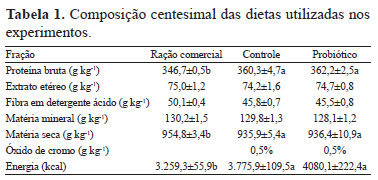The objective of this work was to determine the most adequate feces collection method for sea shrimp (Litopenaeus vannamei) in the determination of the apparent digestibility coefficients of crude protein and dry matter of commercial diets, and to evaluate the effect of supplementation of Lactobacillus plantarum to the diet on the apparent digestibility coefficient of protein, energy, and dry matter. Three feces collection methods were tested: decanting, siphoning, and animal dissection. Decanting was the method best suited for the in vivo determination of the apparent digestibility coeffcients of crude protein and dry matter of commercial diets, since it promoted lower nutrient leaching from feces and was easy to perform. Shrimp fed the diet supplemented with probiotic showed higher apparent digestibility of crude protein (84.18±0.35%) and energy (81.28±0.16%) when compared to the control group (82.73±1.01 and 78.63±0.93%, respectively). The use of L. plantarum as a probiotic additive in shrimp diets can provide nutritional benefits to L. vannamei, with better nutrient utilization.
Lactobacillus plantarum; Litopenaeus vannamei; digestibility; nutrition




